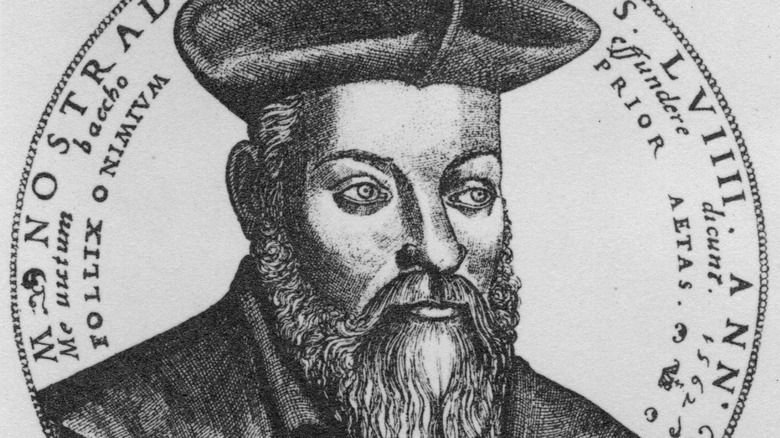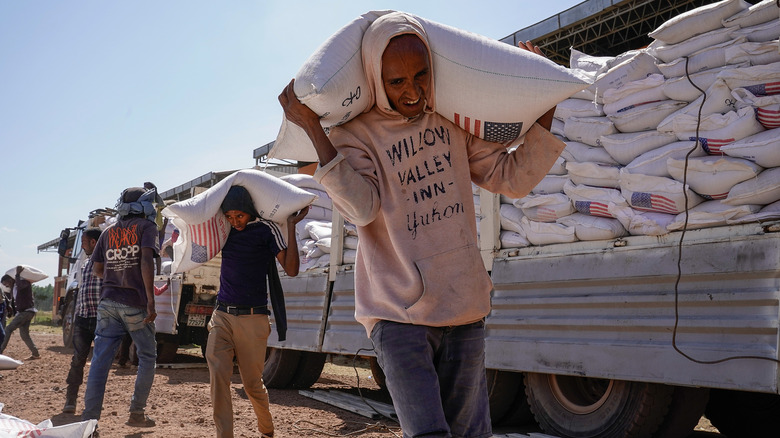Nostradamus Had Some Bleak Predictions For 2022
For centuries, the more superstitious corners of popular culture have been obsessed with the prophecies of a 16th-century French astrologer and soothsayer named Michel de Nostredame, or as he's known by his Latinized name, Nostradamus. As Sky History notes, four and a half centuries after their publication, the soothsayer's quatrains — poems of four stanzas — are still analyzed and debated. Believers say at least some of his predictions have come true, such as poems that supposedly predicted the Great Fire of London or the death of Henry II of France. Skeptics point out that prophecy is an inexact science and that Nostradamus' writings are vague enough that, sure, if you wanted to, you could look at some of them and tie them to just about anything.
Regardless of your take on the seer's purported prophetic abilities, it does appear that his poems mention a few things that, looked at in the right context, are things we may have to deal with in 2022.
Food shortages and cannibalism?
As a companion Sky History report points out, one Nostradamus quatrain appears to reference food shortages, and it's a rather bleak prediction that ends with cannibalism. "So high the price of wheat/That man is stirred/His fellow man to eat in his despair." Now, there have been famines throughout the world on several occasions since Nostradamus wrote these words, so he could have been talking about anything or nothing. However, it does bear noting that there are several factors working together right now that could be pointing to, if not outright famine, then food shortages. Inflation is becoming a problem in the U.S. and Europe, the latter itself dealing with the economic repercussions of Brexit, and supply-chain issues — at least partially caused by the COVID-19 pandemic — have led to food shortages in some places, as The New York Times points out.
So far, these food shortages, such as they are, have been more of a giant inconvenience than an actual famine. However, the global supply-chain issues are far from being solved, and things may well get worse before they get better.
Nuclear annihilation or asteroid impact?
Two other bleak predictions from Nostradamus are far worse than just food shortages and famine; indeed, two of his prophecies could point to worldwide extinction of the human race and possibly a slow, painful, and gruesome end for at least some of us. Specifically, The New York Post posits that this quatrain — "For forty years the rainbow will not be seen/For 40 years it will be seen every day/The dry earth will grow more parched/And there will be great floods when it is seen" — prophesizes a worldwide drought brought on by nuclear winter, itself brought on by Chinese nuclear weapons. Meanwhile, Sky History suggests that the line "Fire do I see that from the sky shall fall" points to an asteroid impact and the resultant effects on human life. Indeed, potentially cataclysmic asteroids are zipping past Earth all the time, and it's a matter of when, not if, one capable of causing a mass extinction event will strike. For now, however, NASA is not predicting any major asteroid impacts or near misses for 2022, but they're keeping their eyes on a space rock that's expected to be coming a little too close for comfort in 2029.
Is Artificial Intelligence going to take over?
While wars (if not of the nuclear variety), famines, and meteor impacts were all things long before Nostradamus had put pen to paper, there's another possible threat that he couldn't possibly have seen coming: the rise of artificial intelligence (AI). For decades, the idea of computers and/or robots gaining sentience and becoming unmanageable has been a staple of science fiction plots, but Nostradamus may have seen it coming centuries earlier. As Sky History notes, the prophet wrote, "The new sage with a lone brain sees it: By his disciples invited to be immortal," which the publication takes to be a warning about AI.
It's an interpretation shared, perhaps with tongue firmly planted in cheek, by The New York Post, which points out that everyone's favorite real-life comic-book supervillain Elon Musk has lately branched out into making robots. Meanwhile, relying too much on AI has already caused real-life problems, such as drivers of Teslas not actually driving their cars and instead relying on its self-driving feature, which is neither foolproof nor intended to be used as a replacement for a human actually driving the car. As The New York Times reports, this feature has led to fatal accidents.



